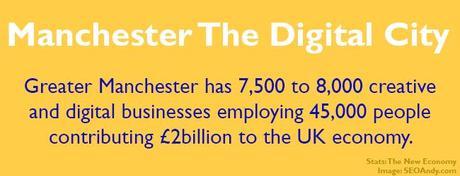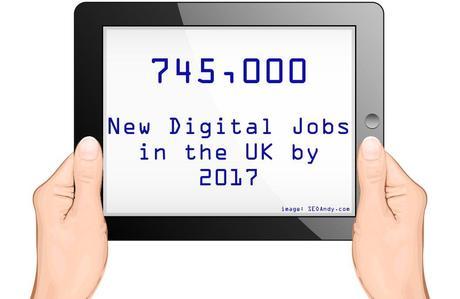 This isn’t the normal post you see here on SEO Andy. This is a post about the ever changing digital world in which we live, and how Manchester in particular is working towards that future. But it’s not just building a great infrastructure, which it is, Manchester is investing in it’s future by investing in young people.
This isn’t the normal post you see here on SEO Andy. This is a post about the ever changing digital world in which we live, and how Manchester in particular is working towards that future. But it’s not just building a great infrastructure, which it is, Manchester is investing in it’s future by investing in young people.
This is a subject close to my heart and something I truly believe will make both Manchester and the Digital World better. Another person who believes in this completely is Jim Clarke (right) of the Manchester Apprentice Academy – so I asked him to write an article to explain why you too should invest in young people.
Why Manchester is Investing in Young People
Manchester has an ambitious goal which is to be a top 10, ‘World Digital City’ by 2020. Sure this is a big goal but the fact is Manchester is a city steeped in a history of achievement, from being at the heart of the industrial revolution, it now has the chance to be at the heart of the digital revolution. It’s history includes the birth of one of the first computers, to the discovery of Graphene. Mr Rolls and Mr Royce met at The Midland Hotel in Manchester and ‘Code Breaker’ Alan Turing went to Manchester University. The Romans even built a fort here. The term Mancunian actually derives from the name of the fort. Importantly Manchester also has a fantastic creative history including the artist Lowry. Music also plays a big part, from the Hacienda, to The Halle, to the Bee Gees and the Stone Roses. Let’s not forget Take That, Oasis and The Happy Mondays. The list goes on. The football teams aren’t too bad either. Whilst all of these things might seem unrelated to digital, they are intrinsically linked, because they have shaped the culture.

The New Economy recently released a report on the creative and digital sector. Did you know Greater Manchester has 7,500 to 8,000 creative and digital businesses employing 45,000 people contributing £2billion to the UK economy. We’ve also got a strong technology industry with businesses such as ANS, Brother, NCC, Siemens and UK Fast operating here, as well incubators like Tech Hub and TiE. Let not forget Media City with major investment from the BBC and ITV.
If Manchester is to achieve its goal, one of the biggest challenges will be skills. I was lucky enough to go out to Silicon Valley two years ago with Winning Pitch, visiting places such as Google and Salesforce, as well as Stanford and Berkeley Universities. As part of the trip, we also met with Alan Blue, one of the founders of LinkedIn. When asked what was the biggest challenge for LinkedIn, he answered recruiting people with the skills. As the digital sector grows, the same will apply here in the UK. According to a recent study commissioned by O2, the UK’s digital economy will require 745,000 additional workers with digital skills by 2017.

Higher level skills are key, however what is also crucial is the incubation of grassroots talent, in other words the next generation. The modern digital industry is still young and there simply won’t be enough people with these skills to meet the demand.
‘Generation Z’ are now starting to enter the workplace. Maybe a better term is ‘D Generation’, aka the Digital Generation. This is likely the first time in history when young people will have the edge when starting out over generations before them. I’ve heard many times parents talking about ‘Toddlers’ navigating the iPad as if they have known it for years. They understand digital and technology because they were born with it.
I am not saying that Generation Z have all the answers, however maybe a collaborative approach is needed where experience and youth work together. There is lots of good work going on around championing the development of digital skills by organisations like the Universities, Manchester Digital and Manchester City Council. Schools are also starting to teach digital skills including coding. The fact still remains though, if Manchester is going to really grasp the opportunity and achieve its destiny, then what is needed is businesses in the digital sector developing grassroots skills. In an sector that moves so quickly, education can prepare them but surely the workplace is where the real learning happens.
Read More About Manchester’s Ambitions:
- Manchester City Council’s Plan to be a Digital City
- The Apprentice Academy, Social Media and Digital Apprenticeship
- Turning Young Heads to Digital – Manchester Digital Blog
- 450 More Young Digital Apprentices Wanted – Prolific North
Manchesetr Skyline by Simon Ridyard
Original Content by SEO Andy @ Manchester’s Destiny

